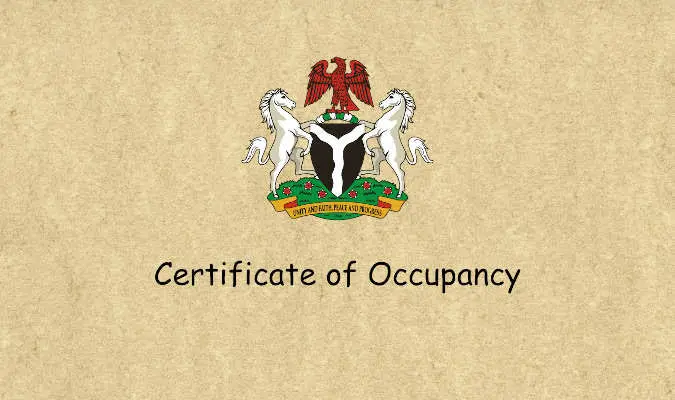Where can I get a certificate of ownership: If you have ever wondered where you can get a certificate of ownership in Nigeria then you are lucky to be on this page. A Certificate of Ownership (also known as a Certificate of Occupancy or C of O) is a vital legal document.
This document establishes ownership rights over land or property in Nigeria. The government issues it to individuals, businesses, or organisations to certify their right to occupy and use a parcel of land.
The importance of obtaining this document cannot be overstated, as it protects landowners from disputes, encroachments, and other legal issues.
If you are looking to acquire a Certificate of Ownership in Nigeria, this guide will walk you through the process, the requirements, and where you can obtain it.
Why Certificate of Ownership is Important in Nigeria
Before diving into where you can obtain a Certificate of Ownership, it is important you understand more what this document represents and why it is necessary.
In Nigeria, land ownership is governed by the Land Use Act of 1978, which vests all land in each state in the hands of the governor. As a result, landowners must obtain permission from the state government to officially occupy and use the land.
The Certificate of Ownership is the official document that gives the holder the legal right to possess and use a specific piece of land. Without this certificate, the ownership of land may be questioned, leading to potential legal challenges.
A Certificate of Ownership also serves as proof of title, making it easier for the landowner to transfer, sell, or lease the land in the future.
Obtaining a Certificate of Ownership is essential for several reasons:
- Legal Protection: With a Certificate of Ownership, you have legal proof of your right to occupy and use the land. This protects you from potential disputes with other parties who may lay claim to the land.
- Financial Security: Banks and financial institutions often require a Certificate of Ownership before approving loans or mortgages for property development. This document provides financial security as it proves you are the legitimate owner of the property.
- Resale Value: A property with a valid Certificate of Ownership is more valuable in the real estate market. Buyers and investors are more likely to purchase property that is legally documented.
- Avoid Encroachment: Without a Certificate of Ownership, your land may be vulnerable to encroachment or illegal occupation by others. The certificate provides a legal basis to contest any such actions.
Steps to Obtain a Certificate of Ownership in Nigeria
Acquiring a Certificate of Ownership in Nigeria involves several steps, which may vary depending on the state. However, the general procedure includes the following:
- Survey the Land: The first step in obtaining a Certificate of Ownership is to have the land surveyed by a licensed surveyor. The surveyor will create a detailed plan of the land, indicating its boundaries and dimensions. This survey plan is a critical document that must be submitted with your application for a Certificate of Ownership.
- Submit an Application: Once you have the survey plan, you will need to submit an application to the relevant land administration authority in your state. This is usually the Ministry of Lands or the Governor’s office. The application will require you to provide personal details, information about the land, and supporting documents, including the survey plan.
- Conduct a Title Search: Before issuing a Certificate of Ownership, the government will conduct a title search to verify that the land is not subject to any existing claims or disputes. This process ensures that there are no conflicting ownership claims or legal issues associated with the land.
- Pay the Required Fees: There are several fees associated with obtaining a Certificate of Ownership, including application fees, survey fees, and processing fees. The exact amount varies depending on the state and the size of the land.
- Inspection of the Land: In some cases, officials from the land administration office may inspect the land to verify the information provided in your application. This inspection helps confirm that the land is suitable for the intended use.
- Approval and Issuance: If the application is successful, the governor or the relevant authority will approve the issuance of the Certificate of Ownership. You will receive an official document certifying your ownership of the land.
Where Can I Get a Certificate of Ownership in Nigeria?
In Nigeria, the process of obtaining a Certificate of Ownership is administered at the state level. Each state has its own land administration authority responsible for processing applications and issuing Certificates of Ownership.
Below is an overview of where you can obtain a Certificate of Ownership in some states across Nigeria:
1. Lagos State
You can get a certificate of ownership in Lagos. In Lagos, the land administration is managed by the Lagos State Lands Bureau. To obtain a Certificate of Ownership in Lagos, you must submit your application to the Lands Bureau, which is located at the Lagos State Secretariat in Alausa, Ikeja.
The bureau is responsible for processing land applications, conducting title searches, and issuing Certificates of Ownership.
2. Abuja (Federal Capital Territory)
In the Federal Capital Territory (FCT), you can get a certificate of ownership through the Abuja Geographic Information Systems (AGIS). This is the agency responsible for land administration.
AGIS processes applications for land titles and issues Certificates of Ownership for properties located within the FCT. The AGIS office is located in Garki, Abuja.
3. Rivers State
In Rivers State, you can get a certificate of ownership through the Ministry of Lands and Survey. It is responsible for land administration. To obtain a Certificate of Ownership in Rivers State, you will need to apply through the ministry, which is based in Port Harcourt.
The ministry oversees the land registration process and ensures compliance with state regulations.
4. Ogun State
This is another state you can get a certificate of ownership. In Ogun State, the Bureau of Lands and Survey is the primary agency responsible for issuing Certificates of Ownership.
You can submit your application to the bureau’s office in Abeokuta. The bureau also provides land surveying services and conducts title searches.
5. Kano State
In Kano State you can get a certificate of ownership through the Kano State Ministry of Lands and Physical Planning. This Ministry is responsible for land administration in Kano.
The ministry processes applications for land ownership and issues Certificates of Ownership to qualified applicants. The ministry’s office is located in Kano city.
6. Anambra State
You can get a certificate of ownership in Anambra through the Ministry of Lands. In Anambra State, the Ministry of Lands, Survey, and Town Planning handles land administration matters.
If you wish to obtain a Certificate of Ownership for land in Anambra, you must apply through the ministry, which is based in Awka.
7. Delta State
In Delta State, you can get a certificate of ownership through the Ministry of Lands and Survey. It is the authority responsible for issuing Certificates of Ownership.
The ministry is located in Asaba, and it handles all land-related matters, including title searches and land inspections.
8. Other States
For other states, the process to get a Certificate of Ownership is similar across other states in Nigeria. Each state has a designated land administration authority, usually under the Ministry of Lands or Survey.
To find out the specific requirements and procedures for your state, you can visit the land administration office in the state capital or consult the state government’s official website.
Documents Required to Obtain a Certificate of Ownership
To successfully apply for a Certificate of Ownership in Nigeria, you will need to provide the following documents:
- Completed application form: This form can be obtained from the land administration office in your state.
- Survey plan: A detailed plan of the land prepared by a licensed surveyor.
- Proof of identity: You will need to provide a valid form of identification, such as a national ID card, international passport, or driver’s license.
- Tax clearance certificate: This document shows that you have paid all necessary taxes, and it is often required before land-related transactions are approved.
- Evidence of land ownership: You may need to provide previous land documents, such as a deed of assignment, sale agreement, or purchase receipt, to prove that you have a legitimate claim to the land.
- Application and processing fees: Ensure you have proof of payment for all required fees, as your application may not be processed without it.
READ ALSO:
- Who Issues Proof of Ownership in Nigeria?
- How to Get a Proof of Ownership Certificate
- Easy Ways to Renew Proof of Ownership Certificate
- Steps to Get a Proof of Ownership Certificate
Challenges You Might Face in Obtaining a Certificate of Ownership
While obtaining a Certificate of Ownership is essential, there are several challenges that applicants may encounter:
- Delays: The process of obtaining a Certificate of Ownership can be time-consuming, especially in states where the land administration office is inefficient. It may take several months or even years to complete the process.
- High Costs: The fees associated with obtaining a Certificate of Ownership can be expensive, particularly in urban areas where land values are high. The costs may include survey fees, application fees, and processing fees.
- Bureaucracy: Nigeria’s land administration system can be complex and bureaucratic, leading to delays and frustration for applicants. It is important to be patient and prepared to navigate the various stages of the application process.
- Corruption: In some cases, corruption may hinder the issuance of Certificates of Ownership. Bribes and kickbacks are sometimes demanded by officials, making it difficult for applicants to obtain the necessary documents without additional payments.
Obtaining a Certificate of Ownership in Nigeria is an important step for anyone who owns or intends to purchase land. This legal document protects your rights as a landowner, enhances the value of your property, and provides financial security.
While the process can be time-consuming and costly, it is essential for ensuring that your land is legally recognized and protected from disputes.
By following the steps outlined above and submitting your application to the appropriate land administration authority, you can successfully obtain a Certificate of Ownership for your property in Nigeria.




